There was a time, not so long ago, when Syria – the conflict that became the Syrian Civil War – seemed like the center of the world. I was still in government at the State Department in August 2013 when we were told to prepare for direct U.S. military intervention in Syria, as a result of Obama's infamous "redline" in the sand in response to Assad's use of chemical weapons. Then he went for a walk in the White House Rose Garden and changed his mind. Obama decided that a nuclear deal with the Iranian regime was more important than Syria.
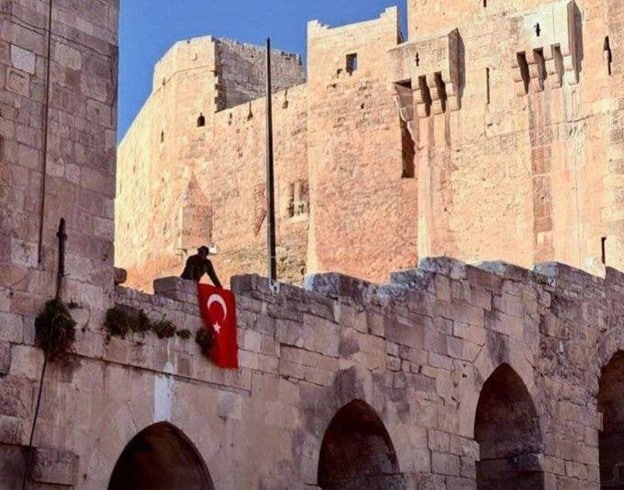
Those same years saw tens of thousands of young people, especially young Muslims, flock to Syria in search of a Jihadist utopia. Syria was the first full-blown social media war. It was – 12 years ago – the original online space for a lot that came after: Hashtag Fridays, media swarms, "Knights of the Uploading," snuff videos, fake videos, citizen journalism. Stuff pioneered in the heat of war and revolution in Syria would be copied by terrorists, regimes, and intelligence agencies, east and west.
Bashar Al-Assad, who had once bused thousands of foreign jihadists to the Iraqi border so that they could kill Americans, almost lost his throne to Syrian rebel action. He was saved by direct Russian, Iranian, and Hezbollah intervention with an assist from the Obama Administration. The agony of the Syrian people continued but jaded Western attention faded, especially after Assad regime successes against Islamist rebels culminating in the fall of rebel-held parts of Aleppo in 2016 and other triumphs later.[1]
But an unfinished, "frozen" conflict suddenly got hot again when a well-planned Syrian rebel offensive – "Operation Deterrence of Aggression" – launched on November 27, 2024, from their enclave around Idlib caught the Assad regime napping. Led by the Salafi-Jihadist Hay'at Tahrir Al-Sham (HTS), the offensive conquered the city of Aleppo and surrounding areas in less than four days, a feat that had taken Assad and his backers four long years to accomplish.[2] And HTS had succeeded with a lot less fighting.[3]
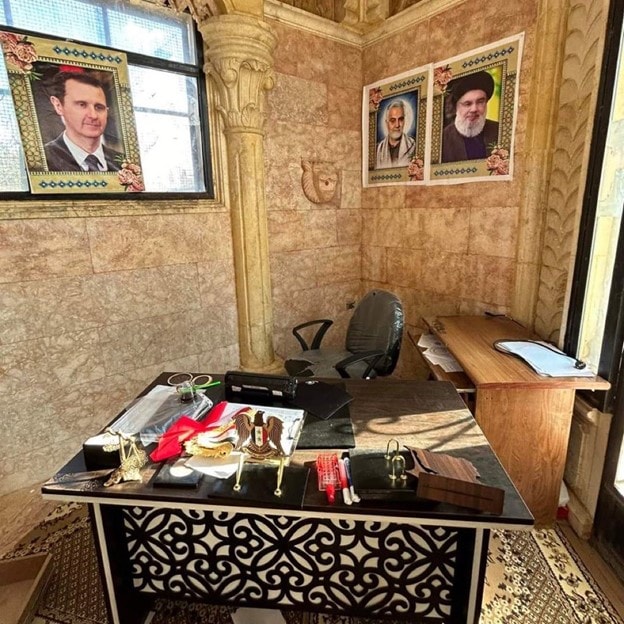
Rural regime militia office captured by Syrian Islamist rebels, November 2024
While many have focused on the current travails of Russia, Iran, and Hezbollah – Assad's military backers and all of them busy elsewhere – the main reason for the HTS victory, aside from excellent operational security and new weapons and tactics, seems to have been that much of the Syrian Arab Army (SAA) is a hollowed-out shell, far weaker than its ostensible numbers and weapons would indicate. Syria is an economic basket case. Officers supplement their meager salaries by taking bribes for soldiers to take extended leave and work at other jobs back home. Some units seem to have broken and fled after losing their officers.
In any case, a city of over two million people and a wealth of military booty fell into rebel hands with relative ease, drawing comparisons with the conquest of Mosul in Iraq by ISIS in June 2014. The rebels continued to consolidate their conquests in the north of the country while heading south on the road to Damascus.
And who are these rebels? Neo-Con Democrat William Kristol tweeted that he hoped that "the Biden Administration is doing everything it can to help the anti-Assad fighters in Syria." In the deeply politicized and partisan online space discussing Syria, these rebels are often depicted as either head-cutting Jihadist mad dogs or freedom fighters just wanting to go home. Both in English and Arabic, there are a wealth of voices and accounts, seemingly reactivated from their years-long slumber, that have gone back to their old tricks – exaggeration, falsehoods, fake or mislabeled videos, guilt by association – in talking about the rebels, Assad, and the conflict.
Syria's Sunni Muslim Arab Islamist rebel groups are not one thing. They are survivors, the product of 13 years of brutal war, infighting, and revolution, a hodgepodge of factions, absorbed, reshaped, purged, and rehabilitated over time. Almost all of them are various shades of Islamist or Salafi-Jihadist. Some are no better than bandits or mercenary guns for hire. All of them are connected or influenced, to a greater of lesser extent, to the Islamist Erdoğan regime in Turkey.
A Man Of Destiny
The most powerful and disciplined faction – HTS – is, according to U.S. law, a designated Foreign Terrorist Organization (FTO). HTS's leader is a remarkable figure in the annals of Jihad. Abu Muhammad Al-Joulani (that is his pseudonym, his real name and even his birth place were not clear for years) was only in his early 30s when he was sent in August 2011 by Abu Bakr Al-Baghdadi, then the head of the Al-Qaeda branch in Iraq – the Islamic State of Iraq (ISI) – into Syria to establish a branch there as the Syrian Civil War began. Al-Joulani was already a veteran Jihadist with a decade of militancy.[4] He had risen through the ranks of ISI to become a senior official, wali of Nineveh province, a rare feat for a Syrian in an organization dominated by Iraqis and fatally obsessed with loyalty.
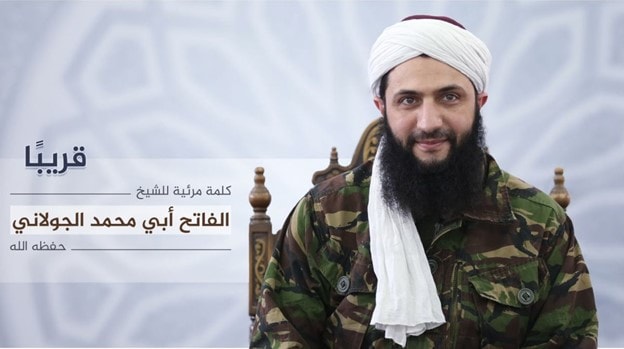
"The Leader" – smiling Sheikh Abu Muhammad Al-Joulani
Al-Joulani was sent in with a brief to assassinate some rival Jihadists in Syria and to establish a secret organization there. He ignored the first task and carried out the second with his group, then called the Al-Nusra Front, first appearing in public in January 2012. Its first known attack was a double suicide bombing against a military target in a Damascus suburb.
It would become an FTO in December 2012, but that would not stop the organization's growth. I remember meeting with Syrian opposition figures, secularists and moderates, in summer of 2012 and they expressed the fear that the Jihadists were better fighters, less corrupt, more professional and seemingly more dedicated than the regular ranks of what was then called the Free Syrian Army. They were concerned that sanctioning Al-Joulani's group would make it even more popular.
Al-Nusra Front, which would become HTS in 2017, would continue to grow, absorbing smaller groups and contingents of foreign fighters as well – Chechens, Uyghurs, and Western Muslims among others. The group was a successful and deadly player in Syria's bloody war but as time went on, Al-Joulani would demonstrate rare political skills.
In April 2013, Al-Baghdadi would formally announce the creation of the Islamic State of Iraq and Syria (ISIS) and publicly admit that he was behind the creation of Al-Nusra and Al-Joulani's sojourn into Syria. That bombshell statement was followed 36 hours later by Al-Joulani rejecting Al-Nusra's incorporation into ISIS and instead claiming loyalty to Dr. Ayman Al-Zawahiri, the distant head of Al-Qaeda. Al-Joulani in a sense appealed to a surprised Al-Qaeda to prevent his group from being absorbed by ISIS. Open civil war had come to the global Jihadist movement.
Al-Joulani's group would become bitter enemies of his old comrades in ISIS or "the Islamic State," the two groups clashing, killing each other, and declaring each other "infidels' worthy of death (the process called takfir). Instead of gloating in public slaughter like ISIS did in its extravagant video productions, most of the killings carried out by Al-Joulani's group would be done discreetly, away from the camera. Al-Joulani would not only demonstrate pragmatism on the battlefield and in ideological struggle but also show a keen sense of media savvy in a series of interviews he would give on the widely-watched Islamist Qatari Al-Jazeera Television, beginning in 2013.[5] These were hour-long infomercials for Al-Joulani and his organization, portraying them in the most positive and reasonable light possible.[6] In 2021, Al-Joulani gave his first interview to a Western journalist.[7]
Al-Joulani's organization would continue to grow even as Assad, with the help of the Iranians and Russians seemed to turn the tide in Syria. By July 2016, it had a name change (first JFS – the Front for the Conquest of the Levant – and then later HTS – the Organization for the Liberation of the Levant) and formally broke ties with Al-Qaeda. This would cause splits within the organization as Al-Joulani sought to nationalize or Syrianize the group. HTS would go on to defeat and destroy a new Al-Qaeda branch and drive out other rival Jihadist, Islamist, and nationalist groups, many of whom would become part of another umbrella organization more formally tied to Turkey, the Syrian National Army (SNA).[8]
The SNA would serve as Turkish mercenaries in Libya and against the Armenians of Nagorno-Karabakh. They would be used to fight Syrian Kurds in Afrin and other sites along Syria's northern border in Turkey while sidelining in various criminal activities.
So, Syria's advancing Islamist rebels in 2024 are not all one thing. Al-Joulani's HTS in 2024 is not exactly the same as Al-Joulani's Nusra Front of 2012. Turkish-influenced HTS is very different from the Turkish-controlled SNA. Al-Joulani's organization is still Islamist, still (relatively) professional and disciplined, it has purged or killed many of its extremists and loose cannons while still remaining – to our eyes – an extremist organization. It is perhaps particularly striking that as Aleppo fell, the SNA, responding to Turkey's priorities, moved east to fight Syrian Kurds, while Al-Joulani's HTS moved south to fight Assad.
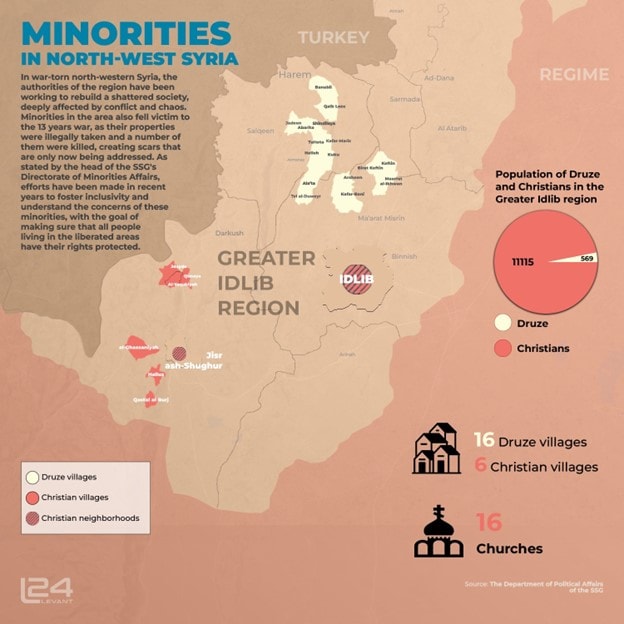
Map produced by a pro-HTS media site showing the non-Muslim population in HTS-ruled Idlib.
Learning to play the propaganda game and to manipulate Western expectations, Al-Joulani over time softened the initial harsh treatment Jihadists in Idlib had inflicted on Christian and Druze minorities, a process that has taken years and seems to have produced some tangible results for these minorities. One of the first things HTS has done in Aleppo is to make several public statements reassuring the city's non-Muslim, especially Christian, minorities about their safety under the new order. Another statement was issued urging reconciliation with Syria's (well-armed) Kurds. "The leader" Al-Joulani's more general statement to the Syrian people issued on November 30, 2024, was an object lesson in diplomacy.[9] Many Syrians were also moved by heartwarming propaganda videos showing HTS fighters returning home to Aleppo after seven or eight years and surprising their mothers at home. Many Syrians who may have no particular liking for HTS are delighted by the surprising turn of events.[10]
I have dwelt at length on the charismatic Al-Joulani and HTS because he and it are rather unique. This is a hardcore Jihadist, a dropout from Damascus medical school, who joined the ranks of Jihad in his early 20s, and has learned not only to survive in an extremely dangerous region but to flourish and who seems to be on the verge of even greater things. This is a capable, dangerous man, one who may combine the ruthlessness and organizational skills of a Yahya Sinwar with real pragmatism and a winning smile.[11] His organization has been refashioned several times, leadership purged, and emerged stronger at each opportunity. He has gone from promising to "conquer" Syria (although the word used, Al-Sham, refers to both Syria and the Levant) to promising to "liberate" her.
Is there any real case to be made that Al-Joulani and his organization are any different than other Salafi-Jihadist or armed Islamist group? That their trajectory will not lead to similar dark alleys and not end in tears as have ISIS and Al-Qaeda (both groups abandoned by Al-Joulani), or Hamas and the Taliban? Nothing is certain or set in stone. The hope is that the Syrian experience is different and that it has somehow tempered and moderated HTS and its leader through the years. There is some evidence of that, for example, in the treatment of religious minorities or in the civilian Syrian Salvation Government that ostensibly rules Idlib.[12] But there is also evidence of ambition, extremism, and the thirst for power.[13] So trusting Al-Joulani and HTS is very much like Oscar Wilde's famous quip about second marriages, "the triumph of hope over experience."
A New Regional Chessboard
Al-Joulani's victory in Northern Syria has also ripped the diplomatic fabric across the region. It seems, and should be interpreted as, a major Turkish victory expanding Turkish influence over Aleppo, a city and region long coveted by Turkish nationalists, the old Ottoman Vilayet of Halep.[14] But it was carried out, mostly, by a man capable of ultimately betraying Erdoğan just like he betrayed Abu Bakr Al-Baghdadi or Ayman Al-Zawahiri. The possibility that someone – not just Assad – will try to kill Al-Joulani seems high. The victory in Aleppo also exposed tensions and fissures in Turkey's fraught relations with Iran and Russia.[15] It also frays Qatar's – allied to Turkey and longtime supporter of Al-Joulani – ties with Iran. It used to be that Qatar could posture as an ally of Turkey and Iran, now it is exposed as favoring the former over the latter.
While the fate of HTS heading south into the Syrian heartland is unclear, on the surface it will be difficult for Assad to quickly recover Aleppo and its environs. He was only able to take the city – the half the rebels controlled in 2016 – with the help of Hezbollah fighters, Iraqi militias, Iranian generals, and Russian firepower. Soleimani and Nasrallah are dead and Russia has its hands full. Iran would need to recruit new infantry cadres in Iraq and Iran, Assad would need to remobilize and retrain troops (this seems to be already beginning).[16] This will take time. And they would have to be reassured that Turkey would not intervene militarily to keep its prize. Turkey may also want to secure a new deal with Russia and Iran to freeze the newest battle lines in place, thereby pocketing the gains won by HTS and its allies.
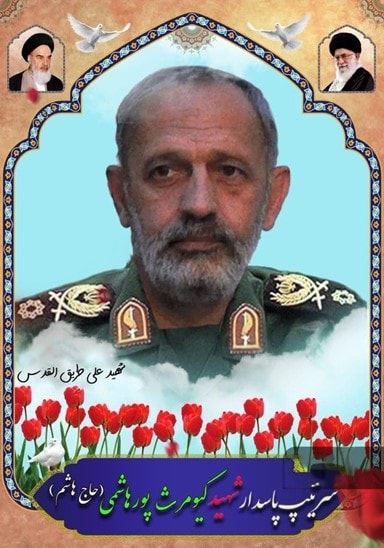
Iranian General Kiumars Poorhashemi, killed in Aleppo, November 27, 2024
But it does seem that Iran and Russia will try to assist Assad. Russia has appointed a new commander in Syria and unconfirmed reports say that Iran is sending its General Jawad Ghafari, "the Butcher of Aleppo," back to Syria.[17] If the past is any guide, a regime offensive orchestrated by Iran and Russia would seek to overwhelm the rebels by sheer weight of numbers. But that will take some time to prepare. And HTS has probably now more than doubled the Syrian population it controls.
There is a very real rivalry between allies Russia and Iran in Syria but that may be shelved for now. The Syrian Arab Army unit, the 30th Syrian Republican Guard (SRG) Division, charged with the main defense of Western Aleppo, was a Russian product. Assad himself – as opposed to the regime he heads – has not looked so weak in a decade.
Faustian bargains are not impossible and perhaps Turkey could be compensated elsewhere, particularly if it includes a final reckoning with Syria's Kurdish region. But sacrificing too much would dent Turkey's symbiotic relationship with its Syrian Islamist allies. Some of the Arab Gulf states are deeply uneasy at the prospect of Assad falling to Syrian Islamists, especially to a movement led by a leader who seems to be both genuinely popular and connected to their rival Qatari neighbors.[18] They will open their pocketbooks once again to promote their preferred outcomes. Israel meanwhile looks on with both interest and concern, their main goal will be to make sure that Syria's border with Israel remains free of potential threats, whether from Sunni or Shia Jihadists with ambitious delusions of grandeur.
Still another wild card is the United States at the cusp of new leadership.[19] It is not impossible that a new Trump Administration could conclude that America has no compelling national interests in Syria at all and that the best thing is for this cornucopia of bad actors – Al-Joulani, Turkey, Iran, Assad, Russia, the Gulf states – to fight it out among themselves. Currently the United States is allied most closely with the leftist/nationalist Syrian Kurds (SDF/YPG), who are bitter enemies of Turkey and maneuver between America, Russia, and the Assad regime in a desperate bid to maintain their hard-won autonomy. It is not at all clear if the Trump Administration, rightly concerned about imperial overreach overseas, will continue with these policies.
With or without American involvement, this deadly minuet of war and diplomacy will continue. Some (Al-Joulani, Turkey) are winning today and some others are clearly on the defensive (Assad, Iran) but it is not at all clear who will be the ultimate winner in the end. And when that end will arrive.
*Alberto M. Fernandez is Vice President of MEMRI.
[1] Spectator.co.uk/article/syrias-conflict-is-heating-up-once-more, November 30, 2024.
[2] Independentarabia.com/node/613050/%D8%B3%D9%8A%D8%A7%D8%B3%D8%A9/%D8%AA%D9%82%D8%A7
%D8%B1%D9%8A%D8%B1/%D9%83%D9%88%D8%A7%D9%84%D9%8A%D8%B3-%D9%84%D9%8A%D9%84%D8%A9-%D8%B3%D9%82%D9%88%D8%B7-%D8%AD%D9%84%D8%A8-%D8%A7%D9%84%D8%B3%D8%B1%D9%8A%D8%B9-%D8%A3%D9%85%D8%A7%D9%85-%D9%87%D8%AC%D9%88%D9%85-%D8%A7%D9%84%D9%81%D8%B5%D8%A7%
D8%A6%D9%84, November 30, 2024.
[3] Lemonde.fr/en/international/article/2024/12/01/lightning-rebel-offensive-in-syria-s-aleppo-in-a-middle-east-in-full-
reconstruction_6734748_4.html, December 1, 2024.
[4] Middleeasteye.net/big-story/syria-war-hts-leader-jolani-inside-world, June 22, 2021.
[5] See MEMRI TV Clip No. 4089, In Wide-Ranging Interview, Jabhat Al-Nusra Commander Al-Joulani Discusses Jihad in Syria, Declares: Our Conflict with ISIS Has Been Resolved, December 19, 2023.
[6] See MEMRI TV Clip No. 4929, Jabhat Al-Nusra Commander Joulani: We Have Instructions To Refrain From Launching Attacks In The West From Syria, May 27, 2015.
[7] Pbs.org/wgbh/frontline/article/designated-terrorist-syria-opposition-abu-mohammad-Al-Jolani-documentary-idlib-province, June 1, 2021.
[8] Cartercenter.org/resources/pdfs/peace/conflict_resolution/syria-conflict/2022/state-of-the-syrian-nationAl-army-march-2022.pdf,
March 2022.
[9] X.com/AlbertoMiguelF5/status/1862934453628084449, November 30, 2024.
[10] Levant24.com/articles/2024/12/repelling-the-aggression-campaign-regionAl-internationAl-and-humanitarian-motives, December 1, 2024.
[11] See MEMRI TV Clip No. 8030, HTS Leader Muhammad Al-Joulani Attends Eid Al-Fitr Celebration with Families of "Martyrs," Gives Children Toys, May 26, 2020.
[12] New R France24.com/en/middle-east/20230511-reporters-notebook-idlib-the-last-islamist-rebel-bastion-in-syria, November 11, 2023.
[13] Dw.com/en/syrian-protesters-rise-up-against-islamists-in-idlib/a-69166416, May 25, 2024.
[14] See MEMRI Special Dispatch No. 9207, Iranian Expert Shohreh Poulab: Erdoğan's 'Red Apple' Project 'Provides A New Version Of Geopolitical Rivalry With China And Russia In Central Asia', March 2, 2021.
[15] See MEMRI Special Dispatch No. 9185, Iranian Academic Rohollah Eslami: 'Turkey Pursues Its Racist Foreign Policy In The Context Of Its Expansionist Behavior'; To Counter The Threat, The Iranian Government Must Prioritize The 'Idea Of Iran' And Its National Interest, February 18, 2021.
[16] Aawsat.com/%D8%B4%D8%A4%D9%88%D9%86-%D8%A5%D9%82%D9%84%D9%8A%D9%85%D9%8A%D8%A9/5087202-%
D8%A5%D9%8A%D8%B1%D8%A7%D9%86-%D8%AA%D8%AD%D8%B0%D9%91%D8%B1-%D8%A3%D9%85%
D9%8A%D8%B1%D9%83%D8%A7-%D9%88%D8%A5%D8%B3%D8%B1%D8%A7%D8%A6%D9%8A%D9%84-%D9%88%D8%AA%D8%AF%D8%B1%D8%B3-%D8%A5%D8%B1%D8%B3%D8%A7%D9%84-%D9%85%D8%
B3%D8%AA%D8%B4%D8%A7%D8%B1%D9%8A%D9%86-%D8%A5%D9%84%D9%89-%D8%AD%D9%84%D8%A8,December 1, 2024.
[17] News-pravda.com/world/2024/12/02/892132.html, December 2, 2024.
[18] Msn.com/en-ae/news/national/uae-president-discusses-syrian-developments-in-phone-call-with-bashar-Al-assad/ar-AA1v3tI
q?ocid=BingNewsSerp, December 1, 2024.
[19] Theconversation.com/us-military-presence-in-syria-carries-substantiAl-risks-but-so-does-complete-withdrawAl-235569, August 16, 2024.




